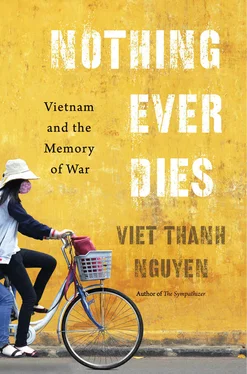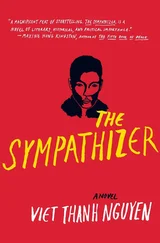Le’s story posits that being an ethnic author writing ethnic stories is not really liberatory, for while a pigeonhole can be home, it is a very small one. But it is not only the confinement of the author by the literary and larger world that the story questions. The father’s reaction illustrates another danger, that the ethnic author may betray those for whom he speaks, and may therefore deserve not the spotlight but the bonfire. The literary world hungers for secrets and calls on the ethnic author to work as tour guide, ambassador, translator, and insider, the all-purpose literary fixer who will hand over the exotic or mysterious unknown. But the ethnic population may want to keep its secrets or feel that its stories and its lives are being misused for the benefit of an author who is a thief and a traitor. 18The tension between the ethnic writer and the ethnic population is also a legacy of race and subjugation, for it is an inequity of stories that compels the writer and the population to be at odds. White Americans experience this inequity from the side of the narratively wealthy, for they control the production of stories, with literature as one key industry of memory. The airwaves and the pages are full of stories about Americans of the dominant class, discussed in all their Whitmanian diversity and individuality. And when these Americans want to know about their others, they can usually find the stories they want to consume, written to cater to their expectations. But while dominant Americans exist in an economy of narrative plenitude with a surfeit of stories, their ethnic and racial others live in an economy of narrative scarcity. Fewer stories exist about them, at least ones that leave their enclaves. Not surprisingly, both the larger American public and the ethnic community then place great pressure on those few stories and those few writers who emerge to stand on the American stage.
This force shapes ethnic literature in general and Vietnamese American literature in particular, providing them with some common generic features. One is the sign of translation within the story, when the author or the narrator explains some feature of the ethnic community, such as its language, food, customs, or history. Since the insiders of an ethnic community obviously do not need these things explained or translated to them, the explanation or the translation implies an audience of outsiders, as critic Sau-ling C. Wong argues in the case of bestselling writer Amy Tan. 19Sometimes the address to an outside audience is explicit, as in Le Ly Hayslip’s When Heaven and Earth Changed Places , where she speaks directly at the beginning and end to Americans, especially veterans, absolving them of any guilt they may feel about the war. Sometimes the address is implicit, as in Lan Cao’s The Lotus and the Storm . In just one example, the character Mai recounts an episode from the classic The Tale of Kieu and says that “Every child in our country grows up with this story.” 20One does not have to explain such a fact to one’s countrymen, only to those who did not grow up with it. In translating like this, authors can speak for the community to those not of the community, a power that can be rewarded greatly, with publication, sales, prizes, and accolades. But in an economy of narrative scarcity and inequity, the ones with real power are the outsiders (to the ethnic literature) who are the insiders of the literary industry: agents, editors, publishers, reviewers, critics, and readers who demand that things be translated to them. The ethnic writer is the literary industry’s employee, a status shared with most American writers. To be an employee does not say everything about the writer but it says a great deal, most importantly about the choice that all writers face: to see themselves as individuals working privately for art (even as that art becomes a commodity), or to see themselves as part of a larger community, imagining in solidarity even if writing alone.
Related to translation, another generic feature of ethnic literature is affirmation. Translators affirm those whom they serve, for while translators serve both sides of the translating relationship, the most important side is the one that pays. How much, exactly, does the person asking for the translation really want to know? Does the translator soften the blow of the translation? Does the translator silence what does not pay? The most subtle and excellent kinds of affirmation are invisible, so ingrained that both the person affirming and the person affirmed simply take for granted what is being said. This implicit version of affirmation in ethnic literature endorses the American Dream, the American Way, and American exceptionalism, the belief that no matter how bad it was over there, things are better here. But that endorsement takes place in stories that also criticize those mythological American ideas. Vietnamese American literature will often bring up the failure of American ideals during the war, while simultaneously affirming how America rescued refugees from that war. Historian Phuong Nguyen calls this maneuver “refugee nationalism,” where the refugee feels bound to America in both resentment for being betrayed and gratitude for being saved. 21Failure and idealism are part and parcel of the ideological power of the American Dream, the American Way, and American exceptionalism, all of which profess that while Americans may falter, they always strive, with the ultimate proof evident in how Americans allow others to speak.
It is arguably the case that the majority of Vietnamese American literature engages in endorsing this kind of American self-regard, partially through what it depicts and more so through what it does not mention or criticize. The philosopher Ludwig Wittgenstein wrote that “what we cannot speak about we must pass over in silence,” and the silence in Vietnamese American literature is about revolution. 22While some Vietnamese American literature reminds Americans that the Vietnamese have been victims, most of it has given up on revolution, which is one of the most important ways of transcending victimization. Most of the literature settles for having a voice, which allows the authors to criticize America, to a degree. But the very existence of that criticism proves that American society allows them to speak, so long as they pass over certain things in silence. Emphasizing the claiming of voice over the act of revolt, the literature inoculates itself against being a radical threat to American mythology. Communism tainted revolution for most Vietnamese Americans, and revolution is already a difficult topic for them to raise in America, which accepts only one revolution, its own, now safely fossilized. Revolution exists as the horizon for most Vietnamese American literature, forbidden in the United States, foreclosed in Vietnam. What remains is either a resentment that returns to the bitter past, more likely to be spoken of in the kind of literature that Americans cannot read, written in Vietnamese, or the desire for reconciliation and closure. Reconciliation and closure are foregrounded in the endings of Hayslip’s and Cao’s books and in the literature that is explicit in its affirmation, as in Andrew Lam’s collection of essays, Perfume Dreams: Reflections on the Vietnamese Diaspora . Here the Viet Kieu — the overseas Vietnamese — embody American possibility, a successful model minority who returns to Vietnam as a kind of Superman, flaunting the American wealth that the Vietnamese could have had, if not for communism.
Vietnamese American literature’s political position on the American landscape as a literature of translation and affirmation might best be described as anticommunist liberalism. As Yen Le Espiritu says, “Otherwise absent in U.S. public discussions on Vietnam, Vietnamese refugees become most visible and intelligible to Americans as anticommunist witnesses, testifying to the communist Vietnamese government’s atrocities and failings.” 23In the literature of these refugees or their descendants, there is faith in America as well as awareness that America needs protection from its worst instincts. There is sympathy for others, bred from the experience of being others. There is an awareness of history, because these authors are shaped by a history they cannot forget. There is an investment in the individual, in education, in free speech, and in the marketplace. All of these liberal gestures take place against the backdrop of anticommunism, not of the rabid, demagogic kind found on the streets of Little Saigon, but the reasonable, intellectual kind that allows for conversation with former enemies, for returns to the homeland, and, most importantly for American readers, the possibility of a reconciliation that will put their war to rest.
Читать дальше












